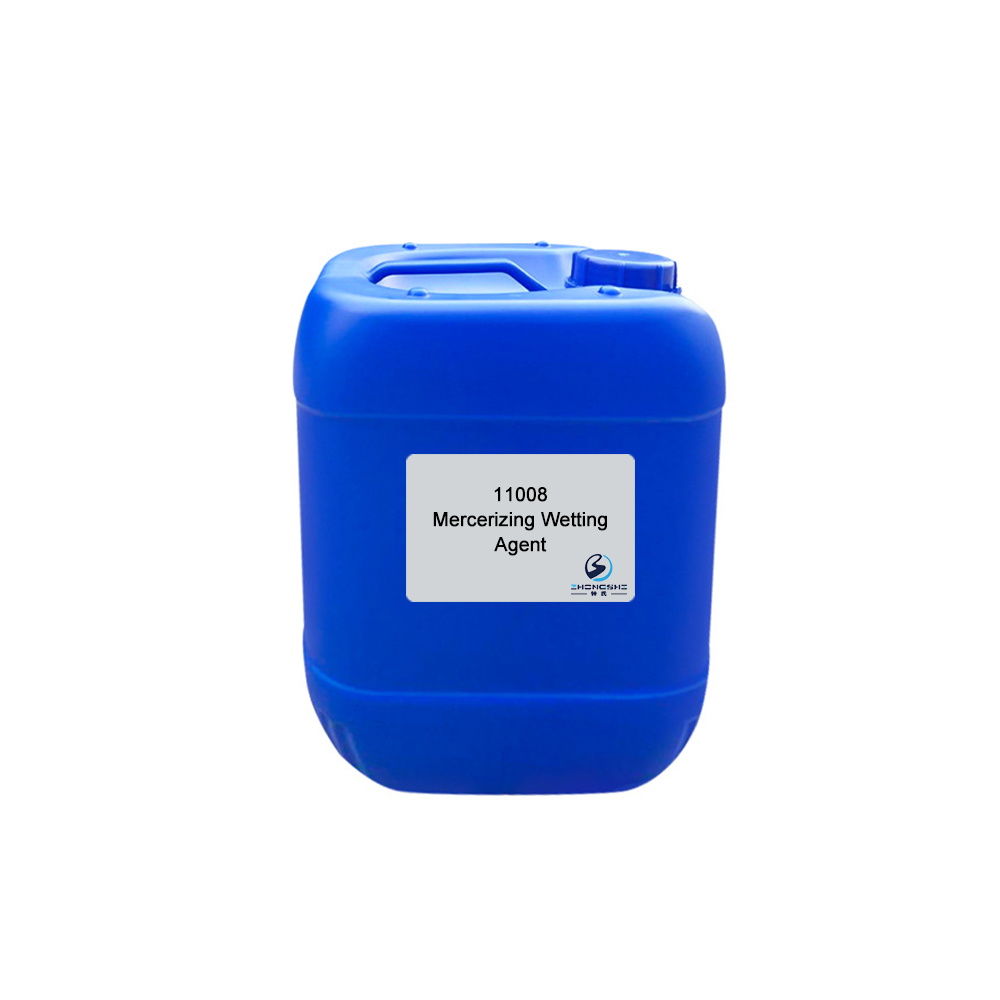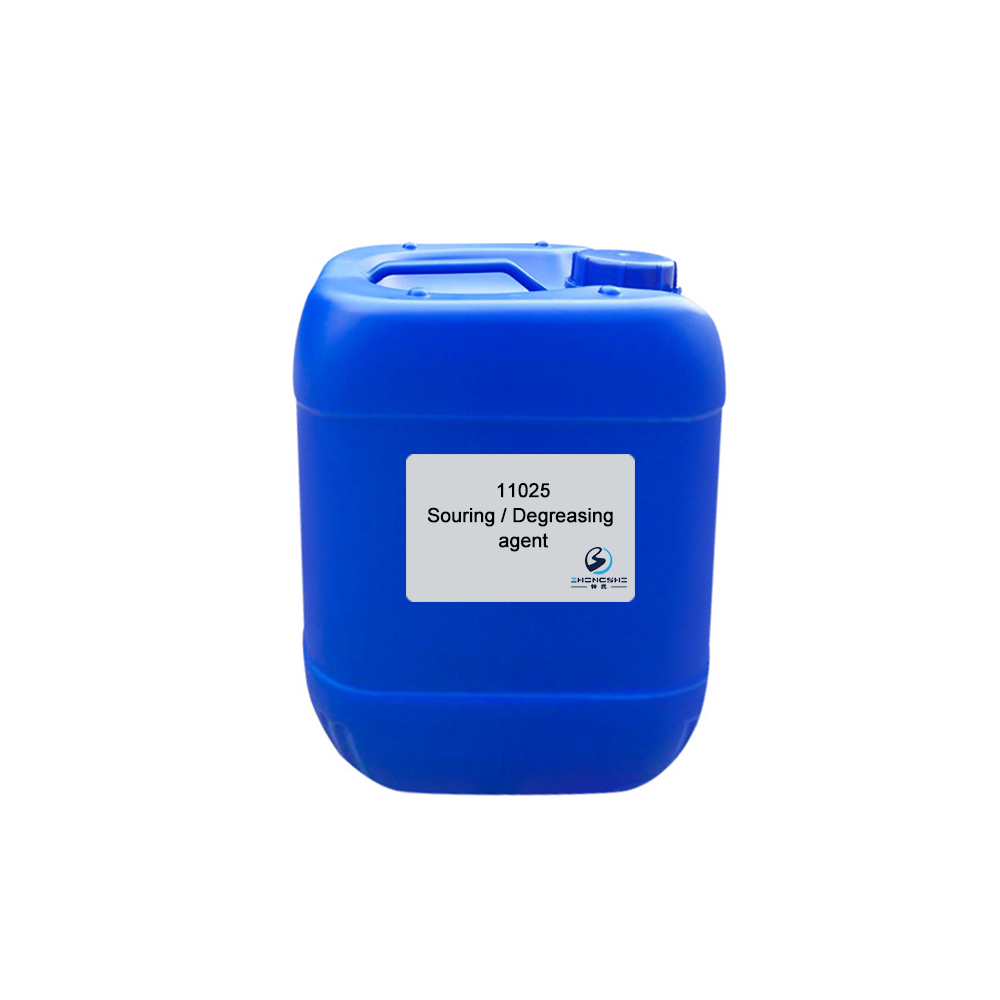11008 Mercerizing Wetting Agent
Features & Benefits
- Contains no APEO or phosphorus, etc. Fits environmental protection requirements.
- Excellent penetrating property in 21~30 °Bé caustic soda solution. Can improve the penetrating property of mercerizing alkali liquor and make the mercerizing process quick and uniform. Saves time.
- In high concentration alkali liquor, keep good stability for long time storage.
- Low foam and no ammoniacal odour in high concentration alkali liquor.
Typical Properties
| Appearance: | Light yellow liquid |
| Ionicity: | Anionic |
| pH value: | 6.0±1.0 (1% aqueous solution) |
| Solubility: | Soluble in water |
| Content: | 40% |
| Application: | Cotton and cotton blends |
Package
120kg plastic barrel, IBC tank & customized package available for selection
TIPS:
Textiles today offer the consumer unending horizons of beauty, variety, and serviceability.
New developments constantly challenge the consumer to know his own needs and his own resources, to encourage the best efforts of industry, and to make wise, thoughtful choices.
Along with the beauty of textiles for clothing and environments, suitability and serviceability must also concern the consumer.
Many individual properties combine to influence the manner in which a fabric or garment or household item performs in wear and in cleaning. The major ones are:
Fiber Content
A fabric composed 100 percent of any one given fiber may be expected to have different qualities than a fabric of one or more fibers blended together or in combination. For example: The qualities of a 100 percent silk fabric would be different from a fabric of 20 percent silk and 80 percent wool.
Yarn Construction
Fabrics may be made from any of the following yarns: filament or staple; woolen or worsted; carded or combed; relatively simple; complex novelty types; or textured yarns. Each type of yarn construction contributes certain qualities to a fabric.
Fabric Construction
Fabric construction may be simple or complex. There are a variety of standard weaves, knits, and other methods of fabrication that have become familiar over the years. But every year, the ingenious fabric designer may produce new and attractive fabric constructions.
Dyeing or Printing
Dyeing or printing of a fabric provides a wide selection of colors and designs. Dye chemistry and the proper application of dyes to fabrics play an important part in the satisfaction users receive from colored fabrics.
Finish
Many different physical and chemical finishes are applied to fabrics to give them added and desirable properties. They may also influence the use and care of fabrics.
Decorative Designs
Decorative designs may be applied to a fabric surface or as a part of the basic weave in construction. They add interest and variety. Many designs give very satisfactory performance in wear and in cleaning; some designs may limit the wear life of a fabric.
Garment Construction
The manner in which fabrics are combined in garment design and construction is a very important consideration for consumer satisfaction. In addition to a well-selected fabric, a garment must have proper cutting and good sewing if it is to be satisfactory in use.
Garment Findings and Trim
Findings and trim are as important as the fabric itself in garment design. If the stitching thread shrinks or interlining bleeds, if the bias or stay tape and the ribbon or embroidery trim do not perform satisfactorily in cleaning, much or all of the value of the garment is lost.
Fabric properties can be determined by laboratory tests, and often results are used to prepare the labels, hang tags, and advertising and promotional material on textile merchandise. These are important sources of current information for the consumer.
Today the consumer’s acquaintance with the world of textile from fiber to finished product is a necessity as well as a pleasure. The information in this handbook has been chosen for its value in furthering a profitable acquaintance with today’s textiles and for its usefulness in helping the consumer expand his knowledge in the future.
About Us
At present, our products include pretreatment auxiliaries, dyeing auxiliaries, finishing agents, silicone oil, silicone softener and other functional auxiliaries, etc., which cover more than 100 types. We have large output and sufficient supply. Our business is all over the country and our products are exported to the middle-east, Southeast Asia, America and Europe, etc.
Guangdong Innovative Fine Chemical Co., Ltd. is looking forward to cooperating with you to achieve a more brilliant future!
Our main products include pretreatment auxiliaries, dyeing auxiliaries, finishing agents, silicone oil, silicone softener and other functional auxiliaries, etc.
★Pretreatment auxiliaries are mainly applied for desizing, degreasing, removing wax and other impurities, etc.
★Dyeing auxiliaries are applied in textile dyeing process to improve the dyeing effect, which make fabrics dyed evenly and prevent dyeing defects, etc.
★Finishing agents are applied for improving hand feeling and performance of fabrics, which can impart fabrics hydrophilicity, softness, smoothness, stiffness, bulkiness, anti-pilling property, anti-wrinkling property and anti-bacterial property, etc.
★Silicone oil and silicone Softener are the important and common chemical in textile processing. They are mostly used to get better softness, smoothness and hydrophilicity, etc.
★Other functional auxiliaries: Repairing, Mending, Defoaming and Wastewater treatment, etc.









